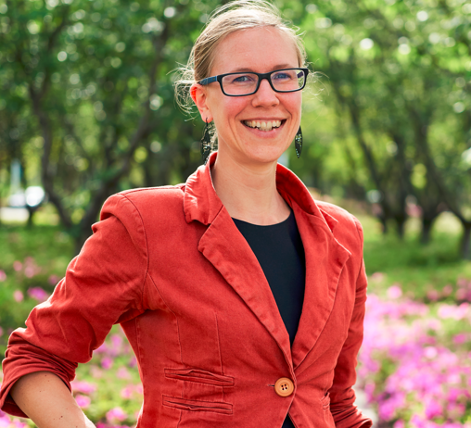By Lingli Tang
Lingli Tang ’22 talked with Dr. Annemieke Van Den Dool, Assistant Professor of Environment Policy, about her considerations that inspire the overall course design to engage students in face-to-face and the emergency online teaching affected by the COVID-19 pandemic.
As a world-class liberal arts university, Duke Kunshan University (DKU) designs its curriculum to provide a high-quality and innovative academic experience for students. On the DKU website, it states that “mastering academic material is the beginning, not the end point.”
How to engage students in the learning process and build an inclusive learning environment are important aspects that need to be addressed during course design. As a student who has taken Public Policy 101 and 301 courses taught by Prof. Annemieke van den Dool, I had an opportunity to interview her and learn about some of her insights in pedagogical practices at DKU. This story articulates how she expresses the DKU animated principles (rooted globalism, collaborative problem-solving and lucid communication) throughout her course design and how she facilitates student engagement in both face-to-face and online courses.
Pre-class course material preparation
Because students come to DKU from diverse countries and cultural backgrounds, Prof. van den Dool selects literature that reflects that diversity. As for her Public Policy 101 and 301 courses, she chooses articles from different countries and encourages students to share relevant sources from their respective countries with fellow classmates. Because the course materials are relevant to students’ lives, it is expected that students will be more engaged. As a practitioner of rooted globalism, Prof. van den Dool hopes, after reading articles written by authors from and about different countries, students can not only be more familiar with policies in their own countries but also gain knowledge about policies in other regions.
In-class activities
Prof. van den Dool usually starts with a short lecture, and leaves the majority of time for students to work in groups and solve real-world problems collaboratively. When I took “Public Policy 101,” Prof. van den Dool would divide us into several groups in almost every class. She assigned each group a policy report and prepared some questions for us to answer. We worked as a team to solve a real-world public policy problem, and if we had any question, Prof. van den Dool would guide us to find the solution, rather than directly telling us answers. During the COVID-19 period, when DKU’s classes moved online, she took good advantage of the “breakout room” function in Zoom to allow students to discuss in small groups. Throughout the course learning process, many friends and I felt that we had lots of interactions with Prof. van den Dool and our peers, and built up our teamwork skills.
After having discussions, Prof. van den Dool usually asks one representative of each group to report their findings. This is helpful to improve students’ lucid communication as well as share viewpoints with other groups. To draw students’ attention to the group presentations, Prof. van den Dool prepares a presentation feedback form to ask students to fill out and offer constructive suggestions to their fellow classmates. One student commented that, “My personal favorites were when we were given 35-45 minutes to prepare a short 3-5 minute in class presentation. I found they were quite fun and gave me chance to continue to grow my oral presentation skills.”
Mid-term reflection and students’ feedback
Learning is a two-way process. Students learn knowledge from professors while professors also adjust teaching and improve course design based on students’ feedback. Prof. van den Dool values students’ feedback very much. During the mid-term of the seven-week session, she always invites colleagues from the Center for Teaching and Learning to her class and gets to know students’ perspectives on their course experience. This helps Prof. van den Dool to adjust course content and teaching methods to make her classes more engaging and rewarding. Such student feedback is even more important during the current online or hybrid learning system. “I’m using new techniques, such as Zoom and Sakai, but still want to ensure a high-quality learning environment,” she remarked. “While it is not always feasible to immediately implement student feedback, the student comments often lead to some kind of change.”
Sakai Forums: the magic for asynchronous online learning and beyond
Curriculum design process is not always smooth, especially during the current COVID-19 period, teaching format transforms from in-person to online teaching. Students are scattered all around the world and situated in different time zones, which makes synchronous interactions between peers and instructor much more difficult.
Prof. van den Dool shares her strategies of creating an online asynchronous discussion through Sakai forum in order to enable students to continue discussions after class. She posts discussion questions in the forum and encourages students to respond and reply to each other. However, she found that students remain very quiet. To overcome this challenge, she decided to lower the number of forum tasks to one or two discussion questions per week and ask students to respond in the same thread rather than each student opening a new thread. After making these adjustments, she observed, “These two changes make it much easier for me to keep track of all the responses and students can more easily refer to other messages in the same thread.”
To get the most out of the forum activities, Prof. van den Dool herself has actively engaged in the online discussion, because “I see the forum as an extension of the classroom environment.” She further explained, “Now that we are not able to meet in person, we have fewer opportunities for discussion and conversation. But exactly those things are crucial in the learning process. Therefore, I actively respond to forum posts by asking questions and providing examples and additional literature. For me, this is a great way to monitor students’ learning progress and identify any misunderstandings or interests in specific topics, which I can then use in the (Zoom) classroom.”
When being asked which aspects of online learning Prof. van den Dool would like to maintain after our return to campus, she mentioned the Sakai Forums. “The forum provides an additional channel for student engagement and gives students a chance to extend discussions beyond the classroom,” said Prof. van den Dool. “It also allows for diversification of student assessment, which benefits students who may be less vocal in the classroom. As an instructor, I can refer to the online forum discussion in the face to face classes and in this way encourage students to speak up in class.”
While the transition to online education was a sudden and big change, Prof. van den Dool’s experience is mostly positive. “I have become familiar with new tools and resources such as Zoom, video lectures, Coursera, and the Sakai forum,” said Prof. van den Dool. “I have expanded my teaching toolbox and look forward to applying these in my future courses at DKU. Hopefully we will be back on campus in the fall, but if (some of us are) not, I’m now well-prepared for hybrid teaching. I feel confident that we will be able to continue to deliver high-quality liberal arts education,” she added.
Faculty Introduction

Assistant professor of environmental policy, Duke Kunshan University
Dr. Annemieke van den Dool’s research interests include public policy, environmental policy, and crisis politics. Her current research focuses on why and how public health crises such as food safety scandals, epidemics, and environmental incidents lead to legal change in China, and what is the nature of such change.
Before joining Duke Kunshan, she was a visiting scholar at Harvard Law School and a lecturer at Mid Sweden University, where she taught courses on public administration, policy processes, and crisis politics.
She has a B.A. in Chinese languages and cultures from Leiden University, the Netherlands; an M.Sc. in environmental science, policy and management from Lund University, Sweden; and a Ph.D. in law from the University of Amsterdam.


